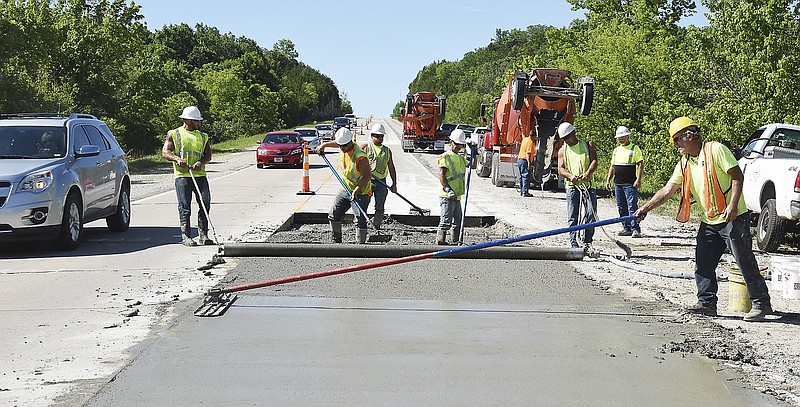Missouri's roads and bridges continue to deteriorate, costing all drivers a total of $7.8 billion a year, according to a new report from TRIP - a Washington, D.C.-based national transportation research group once known as "The Road Information Program."
In Mid-Missouri alone, road and bridge conditions, congestion and the lack of some safety features costs $1,477 per year, per driver, the report said, "due to higher vehicle operating costs, traffic crashes and congestion-related delays."
The report covered all roads and bridges, whether maintained by the state Transportation Department, or by cities and counties.
Carolyn Bonifas Kelly, TRIP's associate director of research and communications, helped write the new report.
"Those costs are, already, startlingly high, and they are projected to grow even higher in the future," she said, "unless the state can provide additional funding that can improve road and bridge conditions, make the system more efficient and less congested, and reduce the number of fatalities and crashes on the state's roads."
Kelly told reporters at a Wednesday afternoon news conference that the new report, "Missouri Transportation by the Numbers: Meeting the State's Need for Safe, Smooth and Efficient Mobility," did not make any comparisons with TRIP's 2015 report on the state of Missouri's roads and bridges.
However, the News Tribune reported on May 1, 2015, that earlier report said the poor condition of Mid-Missouri roads cost area drivers more than $1,300 each year while, statewide, the total costs were listed at $4.5 billion.
The new report found, statewide, "more than half of Missouri's roads are in either poor or mediocre condition," Kelly said. "Here in the Columbia-Jefferson City area, 61 percent of major roads - nearly two out of every 3 miles that you drive on - are in either poor or mediocre condition."
Statewide, she said, 13 percent of Missouri's bridges are structurally deficient - with the report noting Missouri ranks eleventh highest in the nation.
In Mid-Missouri, only 10 percent of the bridges were in that category.
"That means there's significant deterioration to the major components of the bridge," Kelly said. "It's important to note these bridges are (still) safe to travel.
"And they're maintained and monitored on a regular basis by the organizations that are responsible for their upkeep."
The report didn't cite any specific roads or bridges contributing to those numbers.
"Missouri's transportation network is, truly, the backbone of the state's economy," Kelly said. "It moves $495 billion worth of goods in, and out, of the state each year, and it serves the state's 4 million licensed drivers, as well as those who are passing through."
In addition to congestion and deteriorating conditions, she said, the state's road and bridge system has "a high fatality rate - and that will continue to be the case, without additional transportation funding."
SaferMO.COM Spokesman Scott Charton said that's where Proposition D's supporters come in, urging Missourians to vote for the ballot measure Nov. 6.
"Prop D will provide more than $400 million in new, annual funding for Missouri roads and bridges, when it's fully phased in," Charton said.
If voters approve the proposal next month, the state's current, 17 cents per gallon tax on gasoline and diesel fuel would rise to 19.5 cents a gallon on July 1, 2019, then climb another 2.5 cents each year until July 1, 2022, when it would stop at 27 cents per gallon.
"That costs the average Missouri motorist about $1.25 a month," Charton said. "That's about a cup of coffee."
Len Toenjes, president of the Associated General Contractors of Missouri and SaferMO.com's co-chair, said the TRIP report wasn't a surprise.
"I think, for people who drive the roads every day, (the report) quantifies the waste of time, the waste of money (and) the frustration we all feel," he said, "(and) almost closes the case for why we should vote yes on Proposition D."
AGC represents contractors who do big projects, including roads, bridges and major buildings.
Toenjes acknowledged his members would benefit from projects that might be launched if voters approve the tax increase proposal.
"Certainly, short-term, it creates (good-paying) jobs for construction workers," he told reporters. "Long-term, for the next 60-65 years, every school bus, every Highway Patrol vehicle, every ambulance, everybody trying to get their kids to a soccer game, every truck trying to bring a delivery in is going to be using that road.
"So, the long-term, societal benefit is an economic development benefit."
Kelly said, "The condition of Missouri's transportation system has a direct impact on the quality of life.
"It threatens economic growth and has a direct financial impact on the state's drivers."

